National
Top 10 national news stories of 2022
From Club Q to monkeypox to midterm surprises, a year to remember
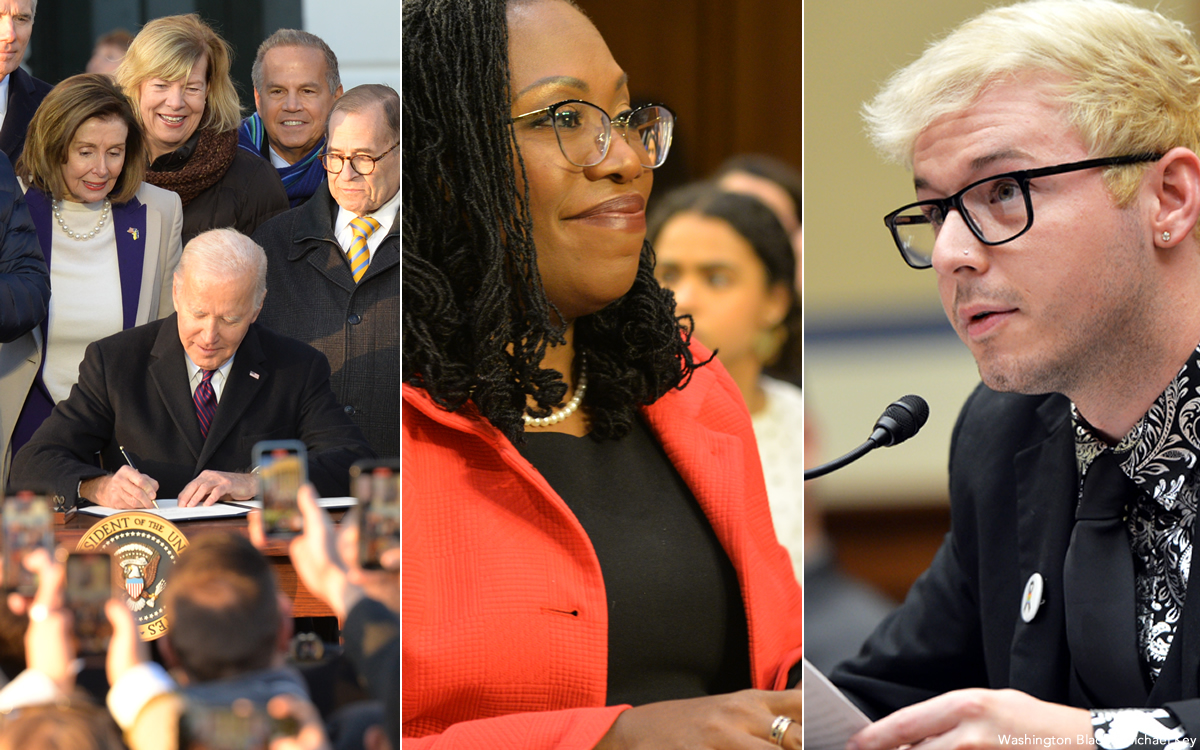
The year 2022 will be remembered for a slew of LGBTQ-related news. As if COVID wasn’t bad enough, the arrival of monkeypox in the spring led to a new panic and new round of vaccinations among gay and bi men. There was the overturning of Roe and fears of attacks on Obergefell. Then came the midterms and the Democrats ran surprisingly strong. And just when we thought the year was over, five LGBTQ people were shot to death at Club Q and Congress managed to pass the Respect for Marriage Act.
Below are the Blade’s staff picks for the top 10 stories of 2022.
#10 Karine Jean-Pierre makes history

Karine Jean-Pierre made history this year, becoming the first Black and the first LGBTQ White House press secretary, having previously served as deputy press secretary to Jen Psaki and chief of staff for then-vice-presidential candidate Kamala Harris.
When Jean-Pierre gave her first White House press briefing last year, on an Air Force One flight bound for Atlanta, she became the first LGBTQ person to do so. Jean-Pierre is also an immigrant born in Martinique, France, to Haitian parents.
#9 Turmoil and change at HRC

Alphonso David’s tenure as the first Black president of the Human Rights Campaign came to an end in 2021 following accusations that David, when serving as counsel to then-New York Gov. Andrew Cuomo, helped to cover up allegations that the politician had sexually harassed and assaulted multiple women. After stepping down from HRC, David filed a lawsuit against the organization alleging discrimination.
On Nov. 28, 2022, Kelley Robinson took over as HRC president, becoming the first Black queer woman to lead the nation’s largest LGBTQ advocacy organization. A veteran community organizer who previously served as executive director of Planned Parenthood Action Fund, Robinson told the Blade she is committed to leading HRC with a focus on intersectionality.
#8 U.S. declares monkeypox public health emergency

In August, the Centers for Disease Control and Prevention declared the monkeypox virus (MPV) outbreak a public health emergency in the United States. Cases by then had been reported in all 50 states, the District of Columbia, and Puerto Rico – almost all by gay and bisexual men who have sex with men.
Initially, the Biden-Harris administration’s vaccination campaign, which involved transporting doses from the Strategic National Stockpile to clinics across the country, was widely criticized as too slow, with problems that carried over from the government’s shaky rollout of tests and vaccines for COVID-19.
By midsummer, however, more shots were being administered in more arms thanks to a coordinated effort by the White House Pandemic Office. The number of MPV cases declined from a peak of 440 per day in August to 60 in October.
#7 Ketanji Brown Jackson joins Supreme Court
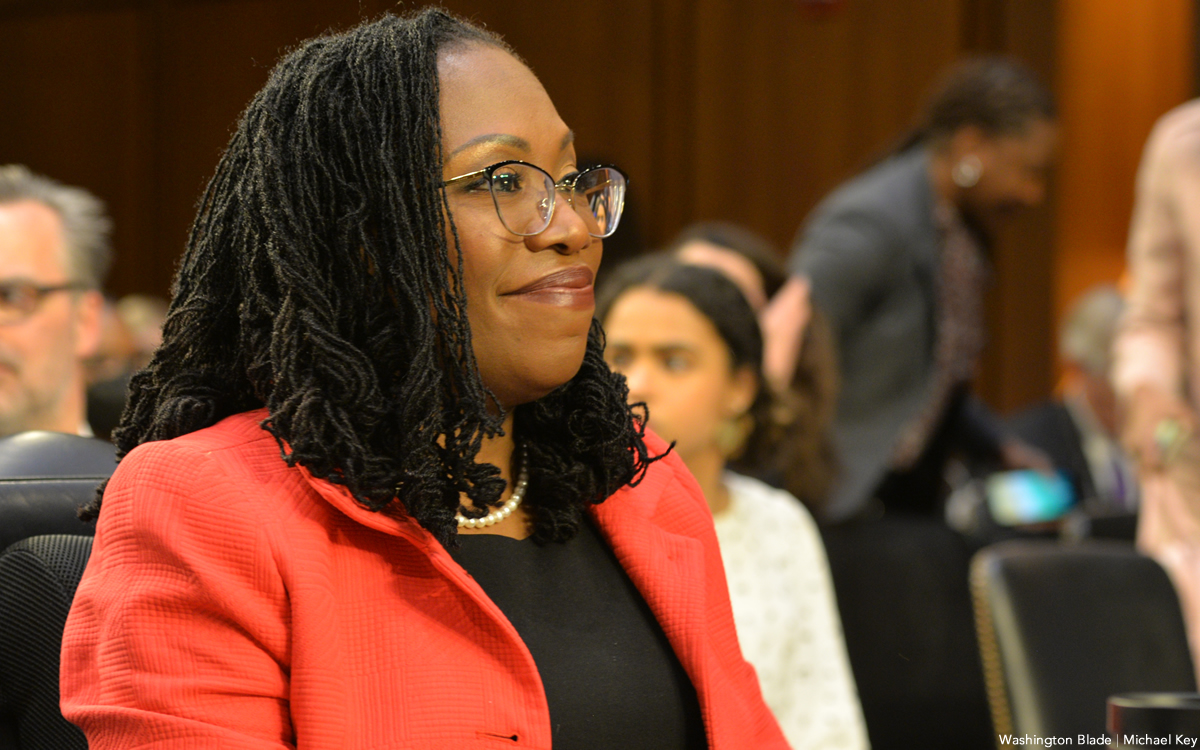
Ketanji Brown Jackson began her tenure as the first Black woman to serve as a justice on the U.S. Supreme Court, having previously presided over the U.S. Court of Appeals for the District of Columbia Circuit.
Before Jackson was seated this summer, the Supreme Court’s conservative supermajority overturned the constitutional right to abortion with its ruling in Dobbs v. Jackson Women’s Health Organization.
This term, the Supreme Court will decide 303 Creative v. Elenis, a case that was brought by a web designer who wanted to reject same-sex couples’ requests for wedding websites and whose outcome could carry broad implications for the enforcement of nondiscrimination laws against providers of public accommodations.
#6 Schools become nexus of battles over LGBTQ rights

As conservative state legislators ramped up attacks on the LGBTQ community with bills targeting youth sports and policies in public schools, right-wing advocates and hate groups increasingly protested all-ages LGBTQ events like family-friendly drag performances and drag queen story hours – often carrying firearms and occasionally causing enough disruption that organizers and patrons were forced to disperse.
From Virginia to Minnesota to Florida, schools were embroiled this year over battles like whether educational materials containing LGBTQ themes should be made available to students and whether LGBTQ students should be outed to their parents.
Critics of Florida’s “Don’t Say Gay” law said it was written with discriminatory intent, warning teachers could be penalized for something as innocuous as displaying a photo of their same-sex spouse.
#5 Record number of anti-trans bills filed across country

More anti-trans bills were proposed this year in state legislatures throughout the country than during any other time in the nation’s history. Most targeted trans youth.
Some laws prohibit trans student athletes from playing and competing, while others restrict access to bathrooms and locker rooms that align with their gender identities and others target guideline directed medical treatments.
Texas Governor Greg Abbott, for example, directed child welfare authorities to investigate suspected cases where parents made gender affirming healthcare available to their trans and nonbinary children.
#4 Pelosi steps down from leadership after husband attacked

House Speaker Nancy Pelosi (D-Calif.) announced her plans to step down from House Democratic leadership after two decades, following the attack on her husband Paul Pelosi by an intruder who broke into the couple’s San Francisco home.
The first woman ever elected to become Speaker, Pelosi has been called the most effective lawmaker to ever serve in that role. Under the administrations of four presidents over two decades, she boasted signature legislative accomplishments like the passage of the Affordable Care Act and repeal of “Don’t Ask, Don’t Tell.” Rep. Hakeem Jeffries (D-N.Y.) was elected to succeed her.
#3 Midterms deliver Trump rebuke, victories for LGBTQ candidates
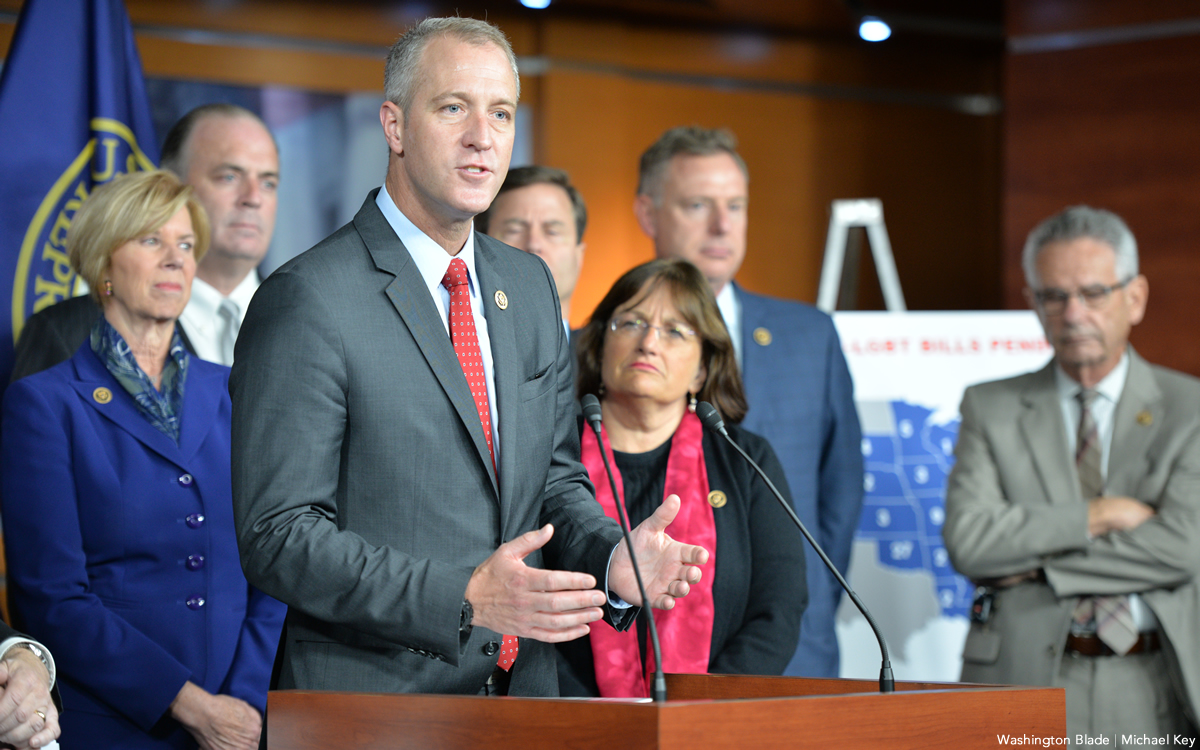
Political observers were surprised by Democrats’ expanded Senate majority and Republicans’ narrow capture of the House following the 2022 midterm elections, which were expected to hand the GOP decisive control of both chambers of Congress.
Not all Democratic candidates were so fortunate, however. Gay New York Rep. Sean Patrick Maloney (N.Y.), for instance, failed to win reelection despite his position as chair of the Democratic Congressional Campaign Committee, the party’s sixth highest-ranking position in the House.
Meanwhile, the LGBTQ Victory Fund reports that a record-breaking number of LGBTQ candidates ran for and were elected to public office – more than 340 and 1,065, respectively.
#2 Club Q shooting and fallout
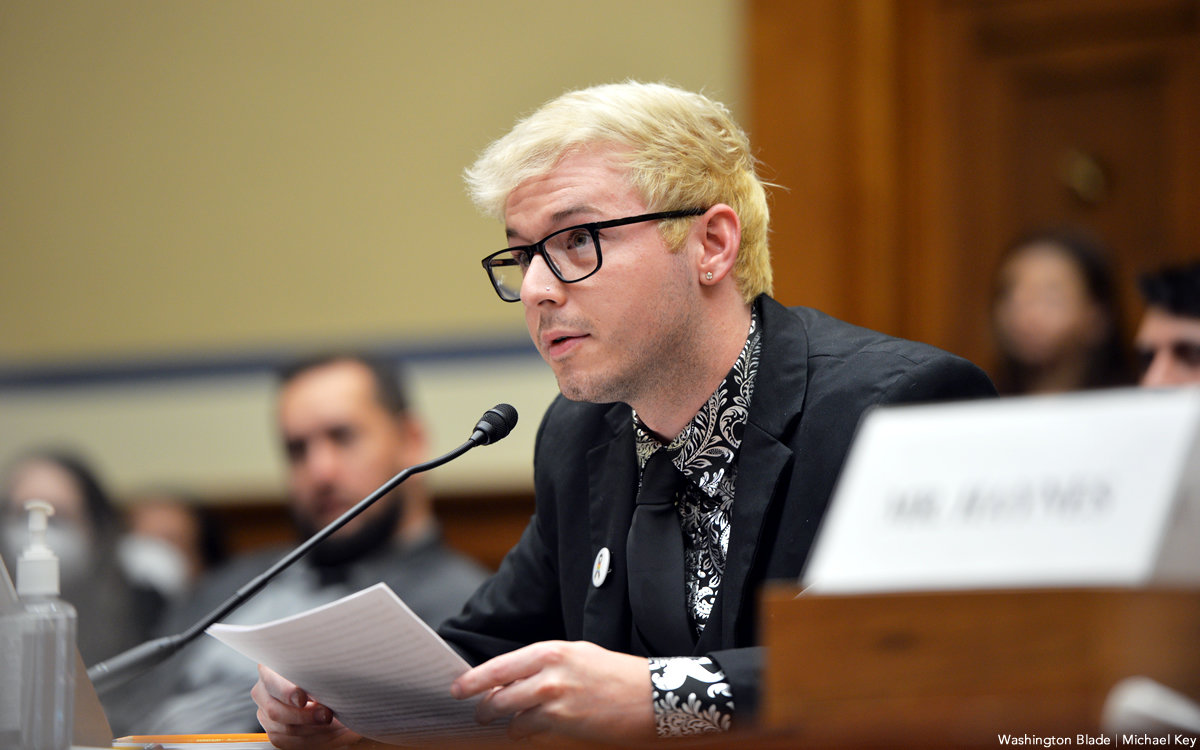
On Nov. 19, the eve of the Transgender Day of Remembrance, a gunman opened fire in Club Q, a Colorado Springs LGBTQ nightclub, killing five people and wounding 17 others in the deadliest attack on LGBTQ people since the Pulse nightclub shooting in Orlando in 2016.
The suspect, who was tackled and disarmed by patrons, including a trans woman, was charged with 305 criminal counts including hate crimes and murder.
The tragedy ignited a conversation about the link between hateful anti-LGBTQ rhetoric and actual violence directed at the community.
#1 Respect for Marriage Act becomes law
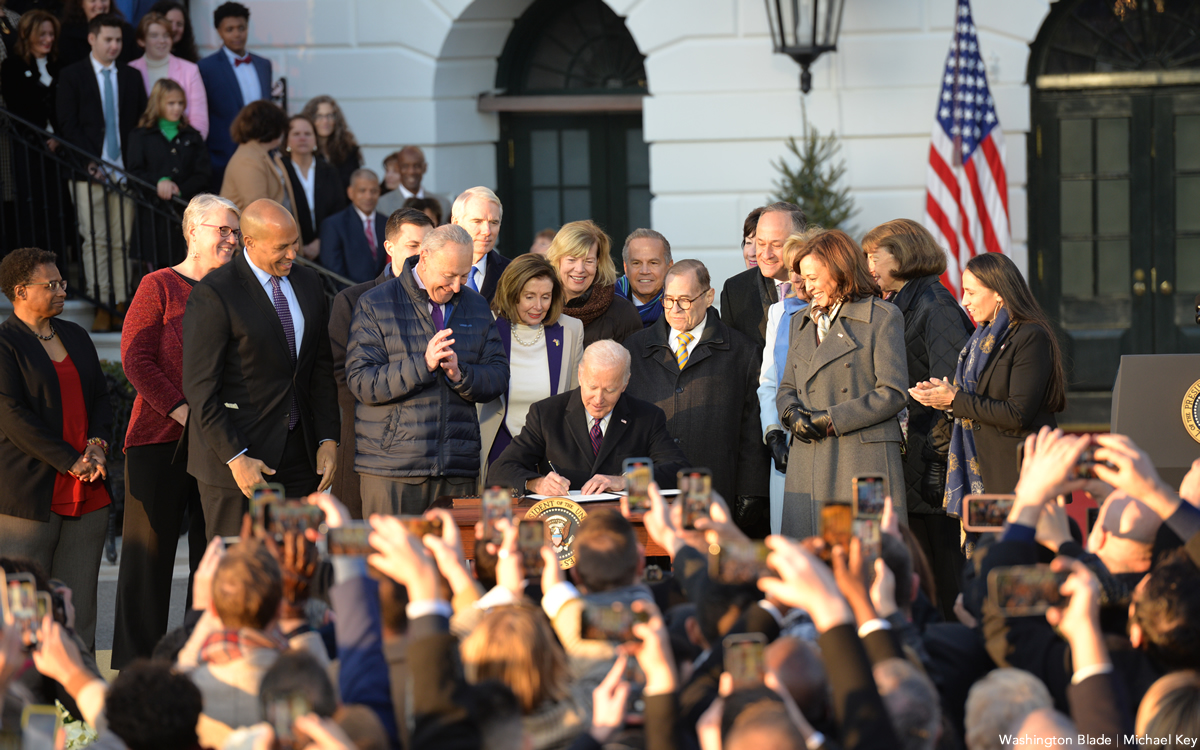
The Respect for Marriage Act, widely considered the greatest legislative victory for LGBTQ rights since the repeal of “Don’t Ask, Don’t Tell” in 2011, was passed by Congress with little time to spare before the end of the legislative session and promptly signed into law by President Joe Biden on Dec. 13.
Should the U.S. Supreme Court overturn or substantially weaken the constitutional right to same-sex marriage, the Respect for Marriage Act will gird against some of the greatest harms that would result for same-sex couples in the United States. Supreme Court Justice Clarence Thomas signaled his plan to revisit the high court’s caselaw governing marriage – along with other fundamental rights – in his concurring opinion in Dobbs v. Jackson Women’s Health Organization, a case whose ruling this summer overturned federal protections for abortion that had been in place since Roe v. Wade was decided in 1973.
National
National resources for trans and gender diverse communities
Amid attacks, help is available from wide range of organizations

The Trump administration has launched a series of executive orders and other initiatives restricting the rights of the transgender community since taking power in January, targeting military service, affirming healthcare, and participation in sports.
Though many executive orders are being challenged in court, it’s an uncertain time for a community that feels threatened. Despite the uncertainty, there are resources out there to help.
From legal assistance to mental health support, here’s a list of nonprofits and organizations dedicated to improving the everyday livelihood of trans and gender diverse people. These are mostly national organizations; there are many additional groups that work in local communities across the country. Some of these national groups will connect those in need of help to a local organization.
LEGAL HELP
President Trump issued an executive order declaring there are only two genders –– male and female –– which applies to legal documents and passports. The order doesn’t recognize the idea that one can transition their gender at birth to another gender.
Ash Lazarus Orr filed to renew his passport with a gender marker reflecting his identity. That was in January, and he still hasn’t received it. He refused to accept a passport without an accurate identification of who he is, so he filed a lawsuit with the ACLU in what is now known as Orr v. Trump.
Orr told the Washington Blade that not receiving his passport back has taken away his freedom of visiting family in Canada and receiving gender-affirming care from a trusted provider in Ireland.
The one thing getting him through this uncertain time is knowing who he’s fighting for –– the trans community, his loved ones, and himself.
“I’m trying to be that person that those younger parts of me needed growing up,” Orr said. Check out a couple of legal support organizations below:
Transgender Law Center
The Transgender Law Center (TLC) provides legal resources and assistance. TLC has a list –– called the Attorney Solidarity Network –– of attorneys that can provide advice or representation for trans people.
The organization also has a legal information help desk that answers questions regarding laws or policies impacting trans people.
Website: transgenderlawcenter.org
Phone: 510-587-9696
Email: [email protected]
Advocates For Trans Equality
With a variety of different programs tailored toward legal assistance and advocacy work, Advocates For Trans Equality’s reach is wide.
The non-profit offers the Name Change Project, which provides pro bono legal name change services to low-income trans, gender-non-conforming and nonbinary people by utilizing its partnerships with law firms and corporate law departments.
Advocates For Trans Equality also has departments and programs dedicated to increasing voter engagement, educating lawmakers on trans issues and offering litigation assistance to a small number of cases.
Website: transequality.org
Phone: 202-642-4542
General email: [email protected]
To contact a specific department or program, visit its website above.
ADVOCACY
Looking to take action and get involved? Act now.
American Civil Liberties Union
The ACLU is a national nonprofit organization that mobilizes local communities and advocates for national causes.
Getting involved is as easy as filling out letters to representatives or signing petitions. One live petition is to “defend trans freedom.”
You can also join its People Power platform, where you serve as a volunteer in your community to “advance civil liberties and civil rights for all.” ACLU has different chapters across the country, so visit its website for more information.
Website: aclu.org
Phone: 212-549-2500
MILITARY AND VETERANS
Trump signed an executive order in January banning transgender service members from serving, stating their identity “conflicts with a soldier’s commitment to an honorable, truthful and disciplined lifestyle, even in one’s personal life.”
Though the order has been legally challenged and struck down by a judge, U.S. Navy Lieutenant Rae Timberlake said it’s created an uncertain atmosphere for themself and other troops.
“All of the transgender service members I know have served with honor and integrity for many years…[and we’re] targeted for removal and not subject to any kind of review based on merit,” Timberlake, who joined the Navy at age 17, said. “There’s kind of just this cloud looming over our organizations and our units, because we know any day our transgender shipmates could no longer be on the team.”
But Timberlake’s message to any service member struggling because of the executive order was one of compassion and truth: “There’s no policy that can take away what you’ve accomplished and what you’ve done.”
Here are some organizations that support service members and veterans:
SPARTA Pride
SPARTA is a peer-support group composed of active duty, veteran and “future warrior” service members.
The group also engages in advocacy work and has helped change policies on gender neutral uniforms and reducing the time a trans service member would have to wait to return to their duties during their transition.
Contact SPARTA to learn more about joining its support network.
Website: spartapride.org
Email: [email protected]
Modern Military Association
Modern Military supports service members and veterans through advocacy, legal assistance and mental health support.
It tracks LGBTQ+ and HIV discrimination through reports made on its website, and offers guidance and advice to whoever submitted the report.
It also supports the mental health of LGBTQ+ veterans and their families through its Resilient Heroes Program. By signing up, you’ll receive virtual peer support and case management services with a mental health coordinator.
Website: modernmilitary.org
Phone: 202-328-3244
Email: [email protected]
CRISIS & MENTAL HEALTH SUPPORT
If you have a more urgent matter, or just need someone to listen, here are some organizations you can reach out to:
The Trevor Project
The Trevor Project offers 24/7 counseling services. Calling, texting or chatting is free and confidential, and you’ll get to speak with someone specialized in supporting LGBTQ youth.
The organization also focuses on public education by hosting online LGBTQ suicide prevention trainings. It advocates for policies and laws that contribute to supporting queer youth.
Website: thetrevorproject.org
Crisis hotline: 1-866-488-7386
General inquiry phone number: 212-695-8650
Trans Lifeline
Trans Lifeline is a hotline run and operated by trans people. Whether you’re questioning if you’re trans or are a trans person just wanting to talk, someone will be there to help. It’s free and confidential, and there won’t be any non-consensual active rescue, such as calling the emergency services.
The line is not 24/7, however. Check out its website for hours within your time zone.
Website: translifeline.org
Phone: 877-565-8860
Here are other organizations that offer support to the trans community:
TransFamilies (support): Support for families with a gender diverse child.
TransLatina Coalition (advocacy): Advocates for the specific needs of the transgender, gender expansive and intersex communities in the U.S.
TransAthlete (information): Provides informative resources about trans athletes.
Campaign for Southern Equality’s Trans Youth Emergency Project (healthcare support): A fund to help trans youth access lifesaving healthcare.
TransTech Social (economic empowerment): Dedicated to discovering and empowering the career-ready skills of LGBTQ+ people.
World Professional Association For Transgender Health (health): Resources, symposiums and research dedicated to improving transgender health.
Sylvia Rivera Law Project (legal): Legal programs and services for marginalized communities.
Gender Spectrum (support): Resources and support groups for trans youth and families.
The Okra Project (support): Creates and supports initiatives that provide resources for the Black Trans community.
The White House
White House does not ‘respond’ to reporters’ requests with pronouns included
Government workers were ordered not to self-identify their gender in emails

White House Press Secretary Karoline Leavitt and a senior advisor in the Department of Government Efficiency rejected requests from reporters who included their pronouns in the signature box of their emails, each telling different reporters at the New York Times that “as a matter of policy,” the Trump-Vance administration will decline to engage with members of the press on these grounds.
News of the correspondence between the journalists and the two senior officials was reported Tuesday by the Times, which also specified that when reached for comment, the White House declined to “directly say if their responses to the journalists represented a new formal policy of the White House press office, or when the practice had started.”
“Any reporter who chooses to put their preferred pronouns in their bio clearly does not care about biological reality or truth and therefore cannot be trusted to write an honest story,” Leavitt told the Times.
Department of Government Efficiency Senior Advisor Katie Miller responded, “I don’t respond to people who use pronouns in their signatures as it shows they ignore scientific realities and therefore ignore facts.”
Steven Cheung, the White House communications director, wrote in an email to the paper: “If The New York Times spent the same amount of time actually reporting the truth as they do being obsessed with pronouns, maybe they would be a half-decent publication.”
A reporter from Crooked media who got an email similar to those received by the Times reporters said, “I find it baffling that they care more about pronouns than giving journalists accurate information, but here we are.”
The practice of adding pronouns to asocial media bios or the signature box of outgoing emails has been a major sticking point for President Donald Trump’s second administration since Inauguration Day.
On day one, the White House issued an executive order stipulating that the federal government recognizes gender as a binary that is immutably linked to one’s birth sex, a definition excludes the existence of intersex and transgender individuals, notwithstanding the biological realities that natal sex characteristics do not always cleave neatly into male or female, nor do they always align with one’s gender identity .
On these grounds, the president issued another order that included a directive to the entire federal government workforce through the Office of Personnel Management: No pronouns in their emails.
As it became more commonplace in recent years to see emails with “she/her” or “he/him” next to the sender’s name, title, and organization, conservatives politicians and media figures often decried the trend as an effort to shoehorn woke ideas about gender (ideas they believe to be unscientific), or a workplace accommodation made only for the benefit of transgender people, or virtue-signaling on behalf of the LGBTQ left.
There are, however, any number of alternative explanations for why the practice caught on. For example, a cisgender woman may have a gender neutral name like Jordan and want to include “she/her” to avoid confusion.
A spokesman for the Times said: “Evading tough questions certainly runs counter to transparent engagement with free and independent press reporting. But refusing to answer a straightforward request to explain the administration’s policies because of the formatting of an email signature is both a concerning and baffling choice, especially from the highest press office in the U.S. government.”
U.S. Military/Pentagon
Air Force rescinds rule barring inclusion of preferred pronouns in email signatures
Conflict with language in military funding package may explain reversal

The U.S. Air Force has issued a “directive to cease the use of ‘preferred pronouns’ (he/him, she/her, or they/them) to identify one’s gender identity in professional communications,” according to a report published in the Hill on Wednesday.
The rule, which applies to both airmen and civilian employees, was first adopted on Feb. 4 pursuant to President Donald Trump’s anti-transgender executive order called, “Defending Women from Gender Ideology Extremism and Restoring Biological Truth to the Federal Government.”
Days after the administration’s issuance of that order on the first day of the president’s second term, the Office of Personnel Management instructed agencies across the whole of the federal government to remove pronouns from email signatures and enforce the policy barring employees from using them.
Additionally, on Jan. 27 Trump published an order barring trans people from joining the U.S. Armed Forces, indicating that those who are currently in serving would be separated from the military. The Pentagon is fending off legal challenges to the ban in federal courts.
Particularly given the extent of the new administration’s efforts to restrict the rights of trans Americans and push them out of public life, the Air Force’s reversal of the pronoun guidance was surprising.
According to reporting in Military.com, the move might have come because officials concluded the rule was in conflict with language in the military appropriations funding legislation passed by Congress in 2023.
The NDAA established that the defense secretary “may not require or prohibit a member of the armed forces or a civilian employee of the Department of Defense to identify the gender or personal pronouns of such member or employee in any official correspondence of the Department.”
-

 Opinions5 days ago
Opinions5 days agoIt’s time for new leadership on the Maryland LGBTQIA+ Commission
-

 The White House5 days ago
The White House5 days agoWhite House does not ‘respond’ to reporters’ requests with pronouns included
-

 Arts & Entertainment5 days ago
Arts & Entertainment5 days ago‘Gay is Good’ Pride Pils Can Celebrates Frank Kameny’s 100th Birthday for WorldPride in D.C.
-

 Sponsored5 days ago
Sponsored5 days agoTHC Drinks: What You Should Know About Cannabis Beverages










